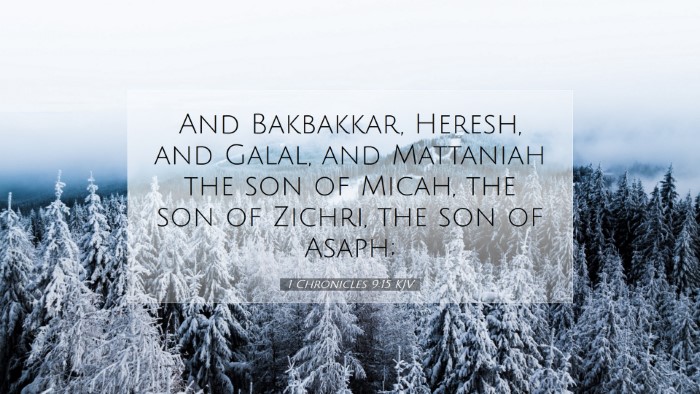Commentary on 1 Chronicles 9:15
Verse: "And of the Levites; Shemaiah the son of Hasshub, the son of Azrikam, the son of Hashabiah, of the sons of Merari;" (1 Chronicles 9:15)
Introduction
1 Chronicles 9:15 is part of a larger genealogical record focusing particularly on the Levitical priests and their duties. The passage emphasizes the importance of the Levitical lineage and sets the stage for understanding their role in the worship and service of God.
Overview of the Levitical Lineage
The verse under consideration mentions the Levite Shemaiah, tracing his lineage back through notable ancestors. This genealogical line is significant as it reinforces the connection of these individuals to the service of the temple.
- Levites' Role: The Levites were set apart for specific duties in the sacred ministry, serving in the tabernacle and later in the temple.
- Historical Context: Understanding the lineage helps in recognizing the fulfillment of God's promises and the continuity of worship practices.
- Importance of Genealogy: In Jewish culture, genealogy denotes identity and God’s covenantal faithfulness.
Exegesis and Interpretation
In his commentary, Matthew Henry highlights how the genealogies found in Chronicles serve to affirm the legitimacy and authority of the Levitical priesthood. Shemaiah, being a descendant directly tied back through several generations, represents this validated ministry.
Albert Barnes remarks on the significance of each name and lineage presented. Each figure mentioned helps to trace a historical path wherein God's faithfulness is constantly demonstrated to His people, a theme throughout the Old Testament.
Adam Clarke offers insights into the meaning of the names presented. Names like 'Hasshub' and 'Azrikam' can reflect specific attributes or divine intervention in their lives, reinforcing how these men were chosen for service.
Thematic Insights
- Divine Selection: The names listed indicate a divine selection process in establishing who would serve in the temple. It shows that service to God is not random but is guided by His sovereign will.
- Covenantal Community: The Levitical lineage embodies the covenant community of Israel. Each generation has a role in worship and teaching, perpetuating a legacy of faith.
- Importance of Memory: The chronicler's detailed genealogies stress the importance of memory in the identity of the Israelites, underscoring that knowledge of one’s heritage is intertwined with faithfulness to God.
Applications for Today
For pastors and theologians, the importance of lineage in Scripture can be a reminder of the significance of church heritage and the ongoing narrative of faith that connects past, present, and future.
Students of the Bible are encouraged to delve deeper into the genealogies as more than historical data; they represent God's working through history, and understanding this can enrich one's faith and appreciation for the Scriptures.
Moreover, for scholars, exploring the genealogies and their contexts fosters a greater understanding of ancient Israelite culture and the pivotal role of the Levites in shaping their worship practices.
Conclusion
1 Chronicles 9:15 serves as a rich verse that opens the door to understanding the importance of the Levitical priesthood and its foundational role in Israelite worship. By examining this verse through the lens of public domain commentaries, we can appreciate the continuity of God’s plan and the significance of faithfulness, identity, and divine selection throughout biblical history.


